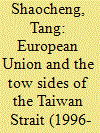| Srl | Item |
| 1 |
ID:
106244


|
|
|
|
|
| Publication |
2010.
|
| Summary/Abstract |
A comparison of the German and Chinese cases clearly shows their differences and parallels. In Germany, despite confrontation between the Federal Republic of Germany and the German Democratic Republic, they were still able to work out a modus vivendi and interact with each other. This kind of "agree to disagree" compromisemust be based on goodwill on both sides and a favorable international environment. In spite of all the parallels with the German case, Beijing is still concerned about Taiwan separatism, the sustainability of the rule of the Kuomintang, and the possible reaction of the United States to cross-Strait rapprochement. Therefore, "constructive ambiguity" based on the 1992 Consensus has to serve as an interim structure before a peace accord can be signed.
|
|
|
|
|
|
|
|
|
|
|
|
|
|
|
|
| 2 |
ID:
097027


|
|
|
|
|
| Publication |
2010.
|
| Summary/Abstract |
The author uses content analysis to examine the European Union's (EU's) policy on relations between the two sides of the Taiwan Strait from 1996 to 2009. During this period, the EU devoted increasing amounts of attention to this flashpoint in East Asia. For geographical reasons, theEU has fewer strategic interests in this region than the United States. Therefore trade and economic interests are high on the EU agenda. Nonetheless,these interests can only be secured if there is peace and stability between the two sides of the Strait. The entry of new member states into the EU since 2004 may have influenced its policy on cross-Strait relations. The firm adherence to democratic values among EU member states is the main reason behind the incessant friction between these states and China. This culminated in the abrupt canceling of the eleventh Sino-EU summit meeting by Beijing in protest at the Dalai Lama's tour of Europe in 2008.Thanks to the change of government in Taipei in May that year, a new era of reconciliation with Beijing has begun. This gives China a free hand to tackle other issues of interest. Also, China has sufferedmuch less from the recent global financial crisis than either the United States or Europe. Yet there is too much at stake for both China and the EU for them to be at odds with each other in the long run.
|
|
|
|
|
|
|
|
|
|
|
|
|
|
|
|